…
The WISE Prize Winner who Faced Up to the Taliban
“I have dedicated my life to promoting the importance of education because I really believe it is the only way to bring peace,” said Dr Yacoobi.
A courageous Afghan leader of education who confronted Taliban militants first hand has been awarded a prestigious global award in recognition of her humanitarian work.
When a group of armed men raided Sakena Yacoobi’s school one day, she came out to greet them and defend her practise. While other staff members locked themselves in an office, terrified for their lives, the senior educator invited the group of Taliban members to sit down for a cup of tea, eventually convincing them to leave the school in peace.
“Of course I thought they were going to kill me,” she said, “but I wasn’t scared. With the help of god I stayed calm and defended myself, telling them how the Quran states a woman’s right to an equal education.”
At a ceremony in Doha, Qatar Dr Yacoobi was named this year’s WISE Prize laureate in front of an audience that included Michelle Obama and a host of education experts from around the world. The award, established by the Qatar Foundation, has come to be regarded as the equivalent to a Nobel Prize in education and donates $500,000 towards the winner’s causes
During the time of Taliban occupation, when education was banned for girls and strict laws dictated what could be taught to children, Dr Yacoobi returned from the US, where she was living as a refugee, to her native Afghanistan to help.
Dr Sakena Yacoobi has been awarded five honourary doctorates and won the Opus Prize in 2013 Alissa Everett
…
José MUJICA, from Uruguay
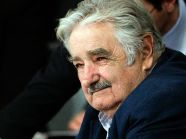 José Mujica, the former president of the Republic of Uruguay from March 1, 2010 to March 1, 2015, deserves all my respect. During his entire term in office, he did not alter any aspect of his life and remained faithful to his beliefs.
José Mujica, the former president of the Republic of Uruguay from March 1, 2010 to March 1, 2015, deserves all my respect. During his entire term in office, he did not alter any aspect of his life and remained faithful to his beliefs.
He declined to live in the presidential palace and preferred to live in his humble farmhouse, a small, weathered dwelling with a corrugated sheet roof. There, he resided with his wife, Lucía Topolansky, a senator, and, like him, a former revolutionary, and his three-legged dog, Manuela. During his time in office, he had no staff, other than two guards who ensured his safety. Mujica refused to “play president. I would have to have three or four servants following me. I wouldn’t be able to get up in the middle of the night in my underwear to go to the toilet.” Furthermore, as he had few belongings, he did not worry about being robbed.
While in office, he would often be seen going shopping or, at times, picking up a hitchhiker in his 1987 Volkswagen Beatle. His simplicity was also reflected in how he dressed: He would attend very important meetings in his sandals.
During his term, he donated 90% of his salary to charities and to organizations for social housing. In the winter, when shelters were filled to capacity, he opened the presidential palace to the homeless. He also legalized same-sex marriage, abortion and the use of marijuana, lowered the salaries of ranking members of his party and opened his country to former Guantanamo detainees.
He preached simplicity. Having only the minimum, he considers himself rich because he has time to dedicate himself to motivating occupations. “That is true freedom, austerity, consume little.” He reminds us of the great philosophers Epicurus and Seneca, and the Aymara Indians who declared: “The poorest is not the one who has little. The poorest is the one who needs a lot to live.”
Before becoming president, he was a guerilla fighter and spent more than 13 years in the prisons of the dictatorial regime (1973-1985). He was beaten, humiliated, put in isolation for nine years with insects as his only companions. For seven of those years he was not even allowed to read a book. This taught him to survive with the strictest minimum. He was also tortured and bullet wounds cover his entire body.
He stated: “I do not regret what I lived. I would never have learned as much as I did. In life, we learn more from pain and failure.” Today, he says, “War is a barbaric, prehistoric method. No matter what the reason for the war, the ones who pay the highest price are always the weakest and those least responsible.” “Living intensely is worth it. You can fall down one, two, three, 20 times, but remember you can get up and start again. The only losers are the ones who stop fighting and the dead are those who no longer fight for life,” he declared.
He considers himself a “former revolutionary” and a “peasant with a vocation.” Mujica said: “For ten years I lived in extremely hard conditions. If I had a mattress to sleep on at night, it was like winning the lottery. So I learned how to sleep with nothing…”
“Let us concentrate that human life is a miracle, that there is nothing more valuable than life. And that our biological duty is above all respect for life, to boost it and understand that we are the specie, it’s us.”
http://www.theguardian.com/world/2014/may/27/jose-mujica-uruguay-maverick-president
https://newrepublic.com/article/120912/uruguays-jose-mujica-was-liberals-dream-too-good-be-true
…
She Left the Legal Profession in Answer
to a Deeper Calling
 A dynamic former attorney from Colombo, Sri Lanka’s capital, Dishani Jayaweera left the legal profession in answer to a deeper calling—to work closely with people throughout Sri Lanka to create a peaceful and just society.
A dynamic former attorney from Colombo, Sri Lanka’s capital, Dishani Jayaweera left the legal profession in answer to a deeper calling—to work closely with people throughout Sri Lanka to create a peaceful and just society.
Dishani, a Buddhist and Tanenbaum’s first Peacemaker from a non-Abrahamic faith, founded the Centre for Peacebuilding and Reconciliation (CPBR) in 2003 with her husband, Dr. Jayantha Seneviratne. Their organization, for which Dishani serves as Executive Director, operates on the belief that the process of building peace begins with individuals. CPBR targets young people and religious leaders, understanding them to be powerful shapers of social attitudes and behaviors in Sri Lanka, and key to bridging religious and ethnic divisions.
In its work, CPBR encourages personal transformations that will in turn empower communities to seek structural and political change. CPBR’s interfaith work promotes understanding among Sinhalese Buddhists, Tamil Hindus, Muslims, and Tamil and Sinhalese Christians through dialogue, training in conflict analysis and transformation, and supporting clergy as they mobilize communities to experience the joy of interdependence and coexistence.
Dishani continues to develop innovative peacebuilding ideas throughout Sri Lanka. Lately, she has dreamed up new ways to engage the youth population.
https://tanenbaum.org/peacemakers-in-action-network/meet-the-peacemakers/dishani-jayaweera/
…
To Nourish Peace in the Maluku Islands of Indonesia
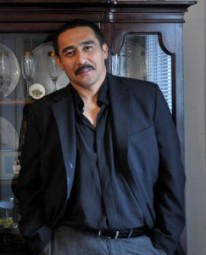 To nourish peace in the Maluku Islands of Indonesia, Rev. Jacklevyn “Jacky” Frits Manuputty promotes an interdependent society, strengthens communal bonds and facilitates public initiative and participation.
To nourish peace in the Maluku Islands of Indonesia, Rev. Jacklevyn “Jacky” Frits Manuputty promotes an interdependent society, strengthens communal bonds and facilitates public initiative and participation.
In 1999-2003, violent clashes between Muslims and Christians in Maluku killed 10,000 people and displaced over 500,000. Rev. Jacky responded with peace campaigns and advocacy nationally and internationally. Because he engaged all parties, he was at times labeled “enemy” by Christians and Muslims alike, as well as the Indonesian military and police. He persisted despite death threats and the destruction of his home by arson. Rev. Jacky personally signed the Malino II Peace Agreement, which ended the violence.
Concerned by the lack of local reconciliation efforts, he co-founded the Maluku Interfaith Institution for Humanitarian Action (LAIM). LAIM creates institutional capacity-building programs, develops positive public discourse, and builds a network of pluralistic conflict prevention observers. Using a multi-level/stakeholder approach, LAIM builds interfaith peace groups of journalists, women, religious leaders and students. In its “live-in” program, clergy men and women spend overnights in each other’s homes in order to build trust and work together to solve social problems in the country. Rev. Jacky and his colleagues have developed a peace curriculum, an interfaith peace sermon program and a trauma healing program. Additionally, LAIM seeks to build community development and the local government’s peacebuilding capacity.
…
Bishop Ntambo Nkulu Ntanda
Organized Care for Street Children,
Helping Reduce Recruitment of Child Soldiers
 From meeting basic medical needs to negotiating with militia, Bishop Ntambo Ntanda has worked at multiple, interrelated levels to build sustainable peace in Katanga province of the Democratic Republic of Congo (DRC).
From meeting basic medical needs to negotiating with militia, Bishop Ntambo Ntanda has worked at multiple, interrelated levels to build sustainable peace in Katanga province of the Democratic Republic of Congo (DRC).
Ntambo became a bishop of the United Methodist Church in 1996, at the start of an armed conflict that has killed 5.4 million people to date. He built brick churches and fishponds, and these physical signs of permanence helped empower the people of Kamina to stand firm, not flee, in the face of approaching rebels.
As the war progressed, Bishop Ntambo provided refuge for internally displaced persons (IDPs) and identified clergy and lay leaders among them to organize systems of relief and support both for IDPs and for those who remained in the areas of heavy violence. He solicited food and medical supplies from the United Methodist Committee on Relief and distributed them to other affected communities as well as his own, through his relationships with local Roman Catholic, Pentecostal and Muslim leaders. In 1998, he created an agricultural training center to develop a way to sustainably feed the displaced. Kamisamba Farm continues to train local farmers and adult and child soldiers seeking to reintegrate into society.
Religious, governmental, traditional/tribal, and military leaders have all identified Bishop Ntambo as a spiritual guide; they have sought him out to pray both with them and for them. His relationships with diverse actors make him an effective mediator. In 2004, the government asked Bishop Ntambo to convene a peace conference with the Mai-Mai (or Mayi-Mayi) militia in Katanga, a group labeled evil by the national army.
As a senator, Bishop Ntambo works within his position to open doors new development projects while keeping his distance from the corruption expected in politics. In 2013, the Congolese government honored Bishop Ntambo with the highest civilian award for public service, the Order of the Leopard. Still Bishop, he connects the peacebuilding experiences and concerns of his people to national decision-making, always seeking better lives for his people.
https://tanenbaum.org/peacemakers-in-action-network/meet-the-peacemakers/bishop-ntambo-nkulu-ntanda/
…
In Pursuit of Peace
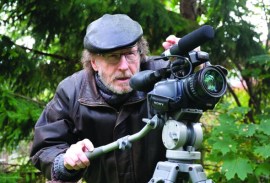 The film In Pursuit of Peace features Ottawa-born Andrew Marshall, who has spent most of his life in Geneva and now is in Paris. He is a world-renowned specialist in political mediation between armed groups and governments, and has worked in Darfur, Nepal and Yemen. “Marshall talks about conflict that he was involved in for five years, others that people focus on for 15, 20 years, and eventually realize that it is just not working. Violence begets violence,” Beitel observes.
The film In Pursuit of Peace features Ottawa-born Andrew Marshall, who has spent most of his life in Geneva and now is in Paris. He is a world-renowned specialist in political mediation between armed groups and governments, and has worked in Darfur, Nepal and Yemen. “Marshall talks about conflict that he was involved in for five years, others that people focus on for 15, 20 years, and eventually realize that it is just not working. Violence begets violence,” Beitel observes.
Canadian filmmaker Garry Beitel concludes that Canadian and world leaders have to wake up to the new reality, that “wars in the world aren’t won by military victory any more, it’s an old model. All the wars in the world are between ethnic groups within countries, and just about every one of these conflicts is resolved by a mediator who steps in and convinces them to put down their arms.
“The world needs to be healed of violent trauma, and that’s what these people are doing, trying to intervene in that way.”
http://www.theseniortimes.com/filmmaker-garry-beitel-views-canada-through-a-lens-of-peace/
…
Betty Oyella-Bigombe, Uganda, Peacemaker
 Betty began her career with the Ugandan government as a member of Parliament in 1986, during a period marked by rebel fighting that ravaged the country’s northern districts. The Lord’s Resistance Army (LRA), under its leader Joseph Kony, used violent guerilla tactics and child abductions, to kill thousands of civilians.
Betty began her career with the Ugandan government as a member of Parliament in 1986, during a period marked by rebel fighting that ravaged the country’s northern districts. The Lord’s Resistance Army (LRA), under its leader Joseph Kony, used violent guerilla tactics and child abductions, to kill thousands of civilians.
In 1988, Betty was appointed as the Minister of State for Pacification in Northern Uganda. In this position, she worked to establish stability and reconciliation in the region, becoming one of her country’s most important peacemakers. One of the greatest challenges to the peace process was convincing Kony and his men to engage with the government representatives. Betty initiated contact with Kony in June, 1993, when she traveled with a small team into the bush to urge him to stop the violence and participate in talks with the government.
In 1997, Betty accepted a fellowship award in International Development at Harvard University. After completing her program with Harvard, she worked at the African Development Bank and the World Bank. However, in 2004, in the wake of the brutal Barlonyo massacre near Lira town in northern Uganda, Betty felt compelled to return to Uganda. She left the World Bank and returned to her homeland to serve as the chief mediator on a second wave of LRA peace negotiations. Although these peace talks ended in 2005, Betty’s work has created a firm foundation for the Juba talks, which are currently taking place on the border of Uganda and Sudan. Betty has served as a Distinguished Fellow at the United States Institute of Peace and the Woodrow Wilson Center. She worked behind the scenes in Uganda to further the peace process and from 2011-2014, Betty served as the State Minister for Water Resources in Uganda’s Cabinet. She now utilizes her peacebuilding skills in her new position as the Senior Director for Fragility, Conflict, and Violence at the World Bank.
https://tanenbaum.org/peacemakers-in-action-network/meet-the-peacemakers/betty-oyella-bigombe/
…
“I have often heard that Afghan women are not political. That peace and security is man’s work. I am here to challenge that illusion.”
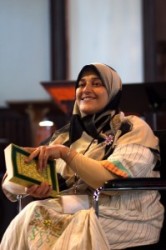 Addressing the United Nations Security Council 2001 meeting on the implementation of Resolution 1325, Jamila Afghani continued, “I am a woman fighting for education. In Afghanistan and Pakistan that is politics. I run a humanitarian NGO. In Afghanistan and Pakistan that is politics.”
Addressing the United Nations Security Council 2001 meeting on the implementation of Resolution 1325, Jamila Afghani continued, “I am a woman fighting for education. In Afghanistan and Pakistan that is politics. I run a humanitarian NGO. In Afghanistan and Pakistan that is politics.”
Raised during the Soviet invasion of her country, Jamila began her peacemaking career as a social worker in Afghan refugee camps in Pakistan. In addition to addressing basic camp needs, she taught Qur’anic education classes. Through these classes, many of the women learned to read and write for the first time. After the fall of the Taliban, Jamila moved back to Afghanistan and founded the Noor Educational Centre (NEC) in Western Kabul, the most war-looted and structurally damaged part of the city. One of her strongest memories of NEC’s first year was the death by stoning of one of her students by another. Responding to evident need, NEC developed accelerated peace education, economic skills training, human rights, and gender training specifically from an Islamic perspective.
https://tanenbaum.org/peacemakers-in-action-network/meet-the-peacemakers/jamila-afghani-3/
…
Azhar Hussain is Leading a Critical Effort
to Equip the Next Generation with the Knowledge
and Skills Necessary for Peace and Reconciliation
 As a Pakistani-American and a Muslim, Azhar Hussain has been personally affected by global extremism as well as sectarian violence in Pakistan.
As a Pakistani-American and a Muslim, Azhar Hussain has been personally affected by global extremism as well as sectarian violence in Pakistan.
Azhar grew up in Pakistan, where he witnessed firsthand the influential role of the madrasa education system on Pakistani students and society. Madrasas, or religious schools, often provide room and board for children who cannot otherwise afford it, and groom them to serve as the future religious leaders of the country.
Formerly the Vice President for Preventive Diplomacy at the International Center for Religion & Diplomacy (ICRD), Azhar (known as Azi to his friends) headed the Madrasa Enhancement Program in Pakistan. In keeping with ICRD’s mission to address identity-based conflicts that exceed the reach of traditional diplomacy, Azi worked tirelessly to engage the Pakistani madrasa leaders and help them develop skills to be agents of peacebuilding, reduce violence, and provide improved opportunities for Pakistani youth.
https://tanenbaum.org/peacemakers-in-action-network/meet-the-peacemakers/azhar-hussain-2/
…
Firmly Rooted in Grassroots Movements and Society
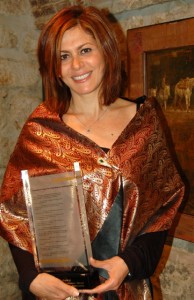 Until the current civil war in Syria, most people knew Hind Aboud Kabawat as an international consultant who divided her time between Damascus and Toronto. However, even before the war, Hind became involved in different citizen diplomacy and educational initiatives to spur positive change in Syrian society. In addition to her legal practice in Toronto, Hind serves as an adviser to many national and international firms and organizations, including the World Bank, the Syrian Public Relations Association, and the Center for World Religions, Diplomacy and Conflict Resolution at George Mason University, where she is a senior research associate in Public Diplomacy.
Until the current civil war in Syria, most people knew Hind Aboud Kabawat as an international consultant who divided her time between Damascus and Toronto. However, even before the war, Hind became involved in different citizen diplomacy and educational initiatives to spur positive change in Syrian society. In addition to her legal practice in Toronto, Hind serves as an adviser to many national and international firms and organizations, including the World Bank, the Syrian Public Relations Association, and the Center for World Religions, Diplomacy and Conflict Resolution at George Mason University, where she is a senior research associate in Public Diplomacy.
Growing up as a Christian in Syria, Hind was surrounded by the rich multi-religious history of the region. In her peacemaking work as an adult, she draws upon religious leaders to help change attitudes, reverse prejudice and work toward conflict analysis and reconciliation in Syria and throughout the Middle East.
In just a few years, Hind quickly established herself as an important figure promoting dialogue among various sectors within Syria and throughout the Middle East. As an international advisor and attorney, as well as an educator and intellectual, she leads public diplomacy efforts that encourage interfaith tolerance and cooperation, modernization, reform and educational innovations in conflict resolution and diplomacy education.
Hind is firmly rooted in grassroots movements and society in Syria and surrounding refugee camps in Turkey and Jordan. Motivating dialogue and conflict resolution skills from the ground up, Hind remains dedicated to building a peaceful Syria. She is also connected with international and academic institutions that give her opportunities to promote change within society. Her latest projects involve trainings for peace activists in refugee camps surrounding Syria. Other past projects include opening a dialogue among Middle Eastern women and Western women from all religions through roundtable discussions on interfaith peace building.
https://tanenbaum.org/peacemakers-in-action-network/meet-the-peacemakers/hind-kabawat-2/
…
A Grassroots Peace Activist
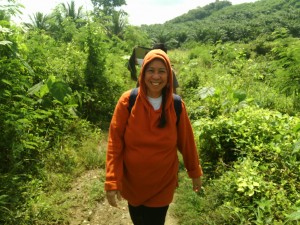 The soldiers’ automatic weapons pressed into her body from different angles, as Deng shielded the priest from a group of inebriated soldiers. Taking in the situation, Deng saw that the soldiers’ name patches had been hastily ripped off, leaving the threads exposed. Composed, she began to negotiate for their lives.
The soldiers’ automatic weapons pressed into her body from different angles, as Deng shielded the priest from a group of inebriated soldiers. Taking in the situation, Deng saw that the soldiers’ name patches had been hastily ripped off, leaving the threads exposed. Composed, she began to negotiate for their lives.
This happened in the 1980s, when the Communist Party of the Philippines’ military, the New People’s Army (NPA), fought the Philippine government for land rights and political control. Peace seemed impossible and communities were shattered as the NPA battled the national military, the police and civilian militias. Maria Ida Giguiento, known to all as Deng, and her colleagues at the Archdiocese of Cotabato were in the midst of the conflict, pursuing justice and peace. It was while they were researching the bombing of a Filipino mountain village, allegedly by the Philippine military, that they were forcibly detained. Clearheaded, Deng negotiated their escape. And despite the harrowing event, she remained steadfast in her peacebuilding and reconciliation work.
Deng’s profound commitment towards interfaith peacebuilding is an expression of her Catholic faith. For more than 20 years, she has worked on the ground in the Mindanao conflict in the Philippines, creating alliances among conflicting Christian, Muslim and indigenous groups. Truly a grassroots peace activist, Deng learned the indigenous Maguindanao dialect from women by shucking corn alongside them, from which her hand still bears a scar. As former Director of Notre Dame University’s Peace Education Center in Cotabato City, she developed programs, facilitated interfaith dialogue workshops with religious leaders, raised awareness about Muslim victims of conflict and helped civil society develop their agenda for peace. That agenda was included in the 1996 final peace agreement accord between the Philippine government and the Moro National Liberation Front (MILF).
Today, Deng is the Training Coordinator for Peacebuilding at Catholic Relief Services (CRS) in the Philippines. She also serves as one of the core Facilitators at the Grassroots Peacebuilding Learning Institute (GPLC) where she trains youth, village elders and leaders from different religions and sectors of society. Deng also serves as one of the core Facilitators at the Mindanao Peacebuilding Institute (MPI) where she co facilitates in training peace educators, peace practitioners, and key stakeholders in peace processes from Asia, Africa, Europe, the Americas. It was at MPI where a new layer of Deng’s peacebuilding initiatives unfolded.
https://tanenbaum.org/peacemakers-in-action-network/meet-the-peacemakers/maria-ida-deng-giguiento-2/
…
Reverend Canon Andrew P.B. White Has Dedicated his Life to Reconciliation in the Middle East
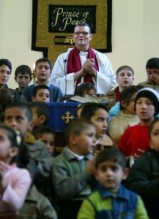 As a fervent religious leader in Iraq, he has been kidnapped, robbed, hijacked, and has received countless death threats over the years. As a British Christian with Multiple Sclerosis, Canon White lives amid the sectarian violence other Westerners only read about, and calls leading Shiite, Sunni, and other Iraqi leaders his close friends in the struggle to end the conflict.
As a fervent religious leader in Iraq, he has been kidnapped, robbed, hijacked, and has received countless death threats over the years. As a British Christian with Multiple Sclerosis, Canon White lives amid the sectarian violence other Westerners only read about, and calls leading Shiite, Sunni, and other Iraqi leaders his close friends in the struggle to end the conflict.
For the last fifteen years, the Anglican vicar, activist, and scholar has dedicated his life to reconciliation in the Middle East by focusing on the positive role religion can play in resolving conflicts. Living in a constant state of risk, he negotiates the release of hostages, forges relations among key religious leaders, brings forth important peace agreements, and provides desperately needed food and shelter to victims of violence. Today known as the “Vicar of Baghdad,” his religious calling has brought his critical peacemaking efforts to Iraq.
Although diagnosed with Multiple Sclerosis, his physical symptoms have hardly slowed him down. As he explains, “If I stop, I feel ill. So I keep going.” The mental strain is more difficult, however, with the loss of many of his close friends and colleagues due to the violence, in addition to his own life being in constant danger. The strength to continue comes from his deep faith, as well as his love and respect or the people of the Middle East. In Canon White’s own words:
“Does the death and destruction of these people really not matter? The pain is great, the anger is great and I am convinced more than ever that the only way forward is to talk. This too is difficult, painful and not without risks but if it only saves one life it is worth it.”
…
His Work Has Had a Powerful and Profound Impact
on Colombia
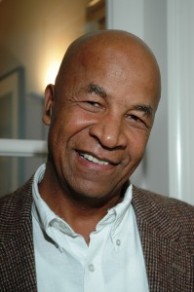 Ricardo Esquivia Ballestas is a lay leader working within the Mennonite Church of Colombia and the Colombian Council of Evangelical Churches. Since 1998, he has represented all non-Catholic religious groups on the National Council of Peace, which advises the President of Colombia. He has participated in national and regional dialogues with both legal and illegal armed groups, including the National Armed Forces of Colombia and members of the Revolutionary Armed Forces of Colombia (FARC).
Ricardo Esquivia Ballestas is a lay leader working within the Mennonite Church of Colombia and the Colombian Council of Evangelical Churches. Since 1998, he has represented all non-Catholic religious groups on the National Council of Peace, which advises the President of Colombia. He has participated in national and regional dialogues with both legal and illegal armed groups, including the National Armed Forces of Colombia and members of the Revolutionary Armed Forces of Colombia (FARC).
Mr. Esquivia is Co-founder and Director of the Commission for Restoration, Life and Peace of the Evangelical Council of Churches of Colombia (CEDECOL). He is also the Founder and former Director of both Justapaz, the Christian Center for Justice, Peace and Nonviolent Action of the Mennonite Church of Colombia, as well as Sembrandopaz, a peace and development initiative of Protestant churches on the North Coast of Colombia. In 2008, Mr. Esquivia’s lifelong work was honored with the Fellowship of Reconciliation’s International Pfeffer Peace Prize.
Ricardo remains active in the peacebuilding community and his work has had a powerful and profound impact on Colombia. The organizations Ricardo has founded, including ASINDECO, Justapaz, ASVIDAS, the Network for Development and Peace of the Montes de María Foundation, and Sembrando Paz, have trained countless people across Colombia.
…
A New Papua
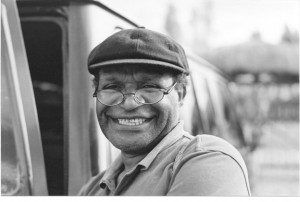 A native of West Papua, the Reverend Dr. Benny Giay is working tirelessly to reconcile conflicts in the region that have claimed tens of thousands of lives and forced many more from their homes. His story is one of faith, courage, and a guiding vision for what he calls “a New Papua.”
A native of West Papua, the Reverend Dr. Benny Giay is working tirelessly to reconcile conflicts in the region that have claimed tens of thousands of lives and forced many more from their homes. His story is one of faith, courage, and a guiding vision for what he calls “a New Papua.”
Born into a family from the Melanesian Me tribe, Benny was a young child when his parents converted to Christianity. He soon followed in their footsteps to become active in the Evangelical Church. His devotion to his faith, however, made him all the more frustrated as he came to recognize the Church’s failure to address human rights’ violations of its own Papuan constituency.
Determined, Benny decided to dedicate his life to making social justice a reality for his community. In doing so, he has reconciled his indigenous and Christian roots, reaching a community that treasures its many historic traditions. The results are new ideas and practices that speak to his fellow Papuans.
A prolific writer, Benny has also produced numerous books and articles exposing the human rights abuses within his community to the outside world. His latest writings outline how to reach a “New Papua” of reconciliation, nonviolence and peace.
One of West Papua’s greatest moral and intellectual voices, Benny is recognized as a man who puts his profound faith into practice as he works for the people he loves.
https://tanenbaum.org/peacemakers-in-action-network/meet-the-peacemakers/reverend-benny-giay/
…
Marie-Hélène MATHIEU
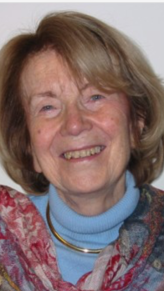 I have chosen to present Marie-Hélène Mathieu, an inspiring woman who I had the joy of meeting in the early 1970s in Trosly-Breuil (at the community of L’Arche – The Ark – founded by Jean Vanier), at the end of the first Lourdes pilgrimage organized by Faith and Light. Faced with the suffering of the parents of two children with a serious disability who had felt marginalised at Lourdes, she launched a remarkable pilgrimage to Lourdes with Jean Vanier for people with intellectual disabilities, their families and friends.
I have chosen to present Marie-Hélène Mathieu, an inspiring woman who I had the joy of meeting in the early 1970s in Trosly-Breuil (at the community of L’Arche – The Ark – founded by Jean Vanier), at the end of the first Lourdes pilgrimage organized by Faith and Light. Faced with the suffering of the parents of two children with a serious disability who had felt marginalised at Lourdes, she launched a remarkable pilgrimage to Lourdes with Jean Vanier for people with intellectual disabilities, their families and friends.
From this extraordinary gesture, Faith and Light, an international association currently present in over 1,500 communities in 80 countries, was born.
The trigger: In 1962, the “Liège Trial” concluded with the acquittal of parents who had killed their profoundly-disabled baby daughter. The announcement of the verdict was met with scenes of jubilation. The violence of the event deeply shook society in both Belgium and France.
It was in this context that Marie-Hélène Mathieu founded OCH in 1963. The Foundation aims to support families, encourage a response to their distress and offer them new hope, particularly through the introduction of a permanent place of welcome and financial support for Christian associations and establishments.
In 1968, alongside the lectures and meetings, Marie-Hélène Mathieu created Ombres et Lumière, the OCH magazine aimed at people with disabilities, their families and friends. The magazine’s reach and influence would exceed expectations.
In addition to OCH and Faith and Light, Marie-Hélène Mathieu was involved in creating the Simon de Cyrène Foundation for people who have suffered a severe head injury. She is also one of the founders of Relais Lumière Espérance, which is aimed at close friends and relatives of people suffering from mental illness, as well as the Groupe de liaison Saint Joseph, which twice a year brings together around twenty organisations working to found and support Christian homes for adults with intellectual disabilities. In the same spirit, the Pierre-François Jamet Working and Communion Group, which she launched with Xavier Le Pichon, enables around thirty small communities to meet and supports them in their care for people suffering from psychological distress.
Marie-Hélène Mathieu was appointed by Pope John-Paul II to the Pontifical Council for the Laity (1984-1989) and as expert for the Holy See at the Council of Europe. She is the first woman to have given a Lent address at Notre-Dame Cathedral in Paris (in 1988). Pope Benedict XVI appointed her auditor to the synod on the Eucharist (2005).
Aware of the plight of the weakest and their families, Marie-Hélène Mathieu is an agent of peace who leaves traces of light and peace wherever she goes.
Marie-Hélène Carette
Quebec
2015-09-28
For further information:
Focus… on Marie-Hélène Mathieu — Faith and Light International:
http://www.faithandlight.org/rubriques/haut/about-us/marie-helene-mathieu
Marie-Hélène Mathieu | OCH:
http://www.och.fr/nous-connaitre/marie-helene-mathieu
…
Marie-Sol St-Onge: A Woman of Courage and Peace
 Marie-Sol, artist and mother of two young children, had both her arms and legs amputated as a result of an aggressive attack by flesh-eating bacteria which occurred in 2012. Marie-Sol St-Onge’s life and that of her spouse, Alin Robert, has since changed.
Marie-Sol, artist and mother of two young children, had both her arms and legs amputated as a result of an aggressive attack by flesh-eating bacteria which occurred in 2012. Marie-Sol St-Onge’s life and that of her spouse, Alin Robert, has since changed.
After a long convalescence, Marie-Sol wrote:
“As lovers of life and parents of two small children, my spouse, Alin Robert, and I have chosen to look at our future with a positive and optimistic outlook. Surrounded by incredible solidarity, I threw myself wholeheartedly into rehabilitation. Today, I walk, I paint with the help of my prostheses and our future is promising once again!”
Often when she meets young people, she talks about the importance of being in good health, of having objectives and of maintaining a positive attitude even in difficult times.
Marie-Sol St-Onge has a precise idea of the message she wants to communicate to the people who attend her conferences, “Absolutely, believe in your dreams and persevere. Do not give up when obstacles get in the way.”
Today, in 2015, after she, with her spouse, published a book entitled, Quand l’Everest nous tombe sur la tête (When Everest Falls on Our Heads), she continues on her path with her family. She combines her work as an artist with engagements as conference speaker. On her website, lesillusarts.com, the section, “Conferences,” contains all the interviews she has given to various audiences since 2012.
Like Marie-Sol often says, without the love of her spouse, Alin Robert, she would not be where she is today. They are a wonderful couple, and with their two sons, they are an inspiring family.
Marie-Hélène Carette
2015-12-16
For more information about Marie-Sol St-Onge:
A testimony to resilience | ICI.Radio-Canada.ca
The Everest of Marie-Sol St-Onge and Alin Robert | L’Écho de Trois-Rivières
Conference | Les Illusarts
http://lesillusarts.com/conference/
Quand l’Everest nous tombe sur la tête | Les Illusarts
http://lesillusarts.com/conference/une-histoire-de-resilience.html
…
Cinema and Media as Instruments
of Reconciliation and Peace
…
Brazilian Couple Sebastião Ribeiro SALGADO
and Lélia WANICK
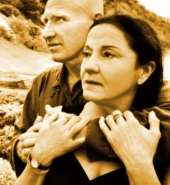 Sebastião Ribeiro Salgado and Lélia Wanick married since the early 1970s, produced The Salt of the Earth, a prize-winning film at the 2014 Cannes Festival.
Sebastião Ribeiro Salgado and Lélia Wanick married since the early 1970s, produced The Salt of the Earth, a prize-winning film at the 2014 Cannes Festival.
Their eldest son Juliano says that his parents share an incredible bond and a single vision of the world.
Sebastião Salgado is a Brazilian photojournalist and “citizen of the world.”Humanist, economist and Marxist, he began his career in photojournalism with projects about humanity’s great ills, Workers in 1993 and Migrations in 2000. Very much aware of ecological issues, in 2013, he returned from an eight-year trip around the world with a series on fauna and flora entitled Genesis. His new black and white portfolio has the effect of an atomic bomb.
Also Brazilian-born, Lélia Wanick moved to Paris early in her life. In addition to her secondary education, she spent several years studying piano at the Conservatory, French at the Alliance Française and attended an artist’s studio to study painting.
Married to Sebastião Salgado, they lived in Paris with theirs sons Juliano, – who followed in his father’s footsteps to become a filmmaker – and Rodrigo who has Down syndrome. In Paris, Lélia studied architecture at Ecole Nationale Supérieure des Beaux Arts, and urban planning at Université de Paris VIII, where she obtained her bachelor’s and master’s degrees.
In 2013, Sebastião and Lélia published together a collection of works entitled Genesis, a portfolio of large-sized prints from various locations on the planet. Later, a mainstream edition presented a different collection of photographs organized into five geographical chapters: Sanctuaries, Planet South, Africa, Amazonia and Pantanal, and Northern Spaces. In their own way, the collection of works and the mainstream edition — both created and produced by Lélia Wanick Salgado — paid tribute to Sebastião Salgado’s Genesis project, a project as grandiose as it was outstanding.
The couple also established Instituto Terra, a private organization which has enabled the reforestation of the Rio Doce Valley in Brazil. This couple, photographers enamoured of the environment, fill our minds, fill our hearts. This makes them peacemakers.
Throughout their lives, Sebastiâo and Lélia have faced together the challenges of life and have had the courage to take great risks, ultimately worthwhile risks. They are among those people who are not satisfied with following the norm or falling into line. By inventing their life, they invent a new reality for humanity.
http://www.institutoterra.org/eng/index.php#.VoW0B1mskSI
Nomination submitted by
Marie-Hélène Carette
Québec, 2015-09-29
________
Support these actions for Peace!
Compose a comment of support at the bottom of the page on the website or email at:
contact@publicpeaceprize.org
The initiatives that receive enough support, in the form of comments that add up to 100 lines of text, will automatically be nominated for the Public Peace Prize – Read the details.
…
..
